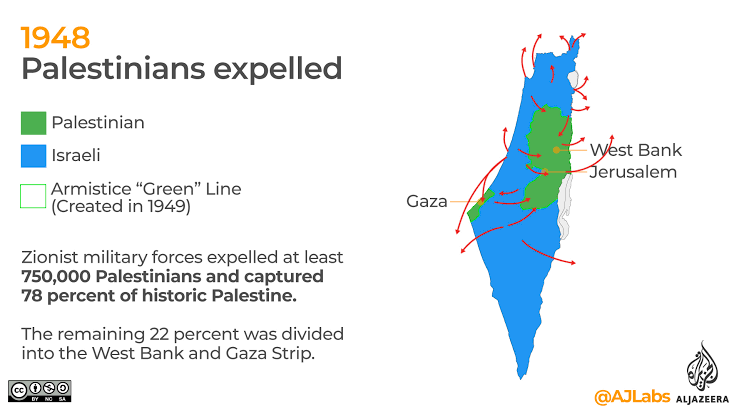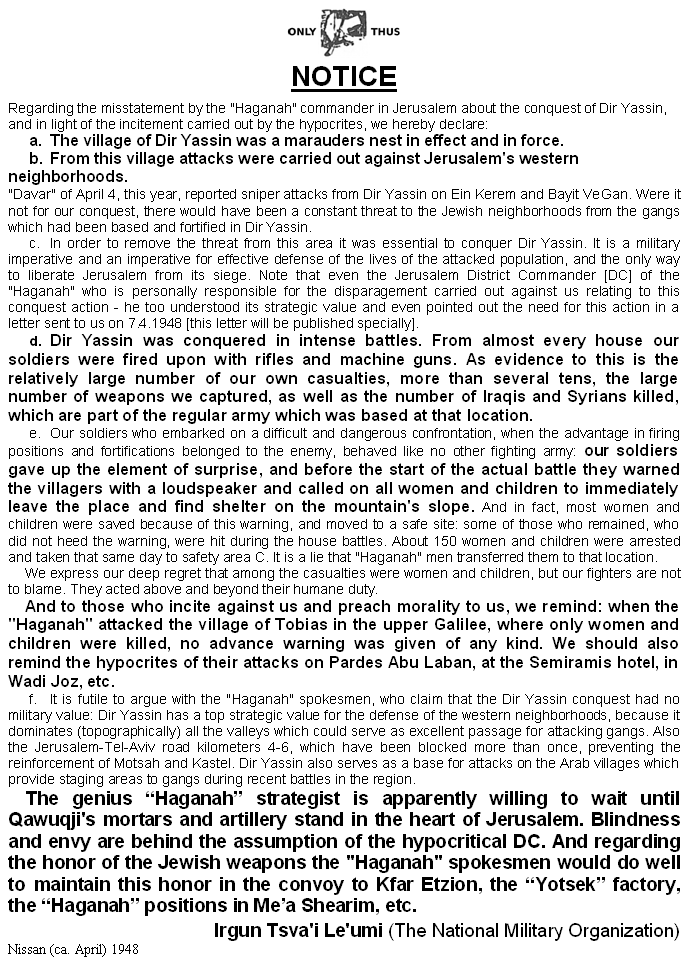Learning Experience Goal:
I will be able to understand the causes, events, and effects of Palestine’s 1948 catastrophe, the Nakba.

3.1 Photo analysis
Look at the two photos below and respond:
What do you see in each photo?
What do you think is happening in each photo?
How do you think the events in these photos are related?
What would you title each photo and why?
3.2 Videos: The NAKBA
Watch “The Nakba” by Vox and respond to the prompts below.
Source: Vox: Missing Chapter, 2023
What is the Nakba, according to the first minute of the video?
“A land without a people, for a people without a land,” was used by many Zionists to refer to Palestine. Is this an accurate statement? Why or why not? Why was it used?
What happened in Deir Yassin?
What were the results of the Nakba?
How do we know what to believe?
There is much information about the Nakba that has been lost or intentionally destroyed by Zionists. And so many people who lived through it have since died. Yet, at the time this is being written (March 2024), there are still living survivors of the first Nakba.
One of the best ways we can know what really happened in the Nakba is to listen to the stories of its survivors.
Watch this film and respond:
How many Palestinians were violently expelled from their homes in 1948?
What followed the Nakba that led to the creation of Israel?
What does Nakba mean and why is it called that?
Why is it important to hear directly from Nakba survivors about the events in 1948?
3.3 What was the NAKBA?
The first Arab-Israeli war
Ben-Gurion declared Israel a country on May 14th, 1948, in the midst of ongoing fighting between Zionist and Arab forces. The next day, a coalition of Arab nations including Egypt, Transjordan, and Syria carried out a major attack on the new colonial state of Israel. Fighting continued for ten months, after which the better equipped Israeli military was victorious. By the end of this “first Arab-Israeli” war, around 6,000 Zionists and around 10,000 Arabs had died. Losses on both sides included military as well as civilian deaths. For the indigenous people of Palestine, an Israeli victory meant not only death, but displacement from their homes.
This was the Nakba.
Source: Palestinian refugees fleeing their homes near Haifa in June, 1948. Photo by David S. Boyer for Corbis
From Project 48
THE NAKBA
The Nakba means “catastrophe” in Arabic. It refers to the violent ethnic cleansing and mass expulsion of Palestinians before and after the declaration of Israel in 1948. This violence was carried out by the recently arrived Zionist forces, including the paramilitary extremist group the Irgun.
According to The Interactive Encyclopedia of the Palestine Question, “about 280,000 Palestinians went to the West Bank; 70,000 to the East Bank of the Jordan River; 190,000 to the Gaza Strip; 100,000 to Lebanon; 75,000 to Syria; 7,000 to Egypt; 4,000 to Iraq; and the rest to other Arab countries. The direction of their migration was largely determined by where they were. For example, the majority of those who fled from the northern districts of Acre and Haifa headed north across the border into Lebanon; those from Safad, Tiberias, and Baysan in the northeast fled to Syria. Most of the residents of the coastal cities Lydda and Ramla fled east to what later became known as the West Bank, and those from southern cities such as Isdud, al-Majdal, and Bir al-Sabi' went to the Gaza Strip or east to Hebron.”
The Nakba resulted in 750,000- 800,000 indigenous Palestinians being forced from more than 500 Palestinian towns and villages.
Today around half of all Palestinians in the world are descended from those displaced in the Nakba. To this day, they are denied the right to return to their homeland by the Zionist Israeli state.
Source: First Prime Minister David Ben-Gurion and his wife Paula at the Palestinian port of Haifa, June 30th, 1948
Source: Excerpts from “Jewish Atrocities in the Holy Land", published by the Arab League in 1948.
Source: Hebrew public statement of the Irgun about the Deir Yassin massacre, English translation. April 1948
What’s your biggest takeaway from this video?
3.4 Israel’s Independence Day
Israel’s Independence Day is celebrated on May 14th.
Watch the video ‘Independence Day in Israel” and respond to the questions below:
What is your first reaction to the film? What feelings and thoughts, etc. stood out?
How do Israelis celebrate their independence day?
Why is May 14th, 1948 significant to Palestinians, as well?
What inferences can you make about Israel and Israelis based on this video?
Does Israel remind you of any other country, based on this video? Explain.
3.5 Reflect on your learning
“Shukria Othman, 86, is one of many still living survivors of the 1948 Nakba. (MEE/Fareed Taamallah)
1. If you could interview a survivor of the Nakba, what questions would you ask them?
2. What do you think were some of the long-term effects of the Nakba on those who survived?
3. What is the right of return? Why do Palestinians claim they should have that right?
4. What do you predict life will be like for the Palestinians with Israel in power?
3.6 BONUS LEARNING
Series on the Nakba by Al Jazeera, Episodes 1-4









